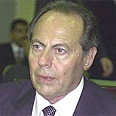
Emile Lahoud
Photo: Reuters
Lebanon's parliamentary speaker postponed a vote on Friday that was the last chance to choose a president before the pro-Syrian head of state, Emile Lahoud, leaves office at midnight.
Speaker Nabih Berri, who is also a Shiite opposition leader, delayed the election for a fifth time because rival factions were deadlocked. He set a new session for November 30.
"To allow for more consultations to arrive at the election of a president... the session is postponed to Friday, November 30," Berri said in a statement read on his behalf.
The decision means Lebanon will be without a president for at least a week. Unless a consensus candidate emerges, many fear the dispute may lead to two competing administrations and violence in a country still scarred by its 1975-1990 civil war.
More than 100 lawmakers from the Western-backed majority and the Hizbullah-led opposition went to the parliament building in downtown Beirut, but opposition MPs did not enter the assembly chamber in line with a boycott declared a day earlier.
Berri announced the delay after separate meetings with majority leaders Saad al-Hariri and Walid Jumblatt, a sign that the rival camps have not yet burned all their bridges.
"We are for consensus and we will remain for consensus," Hariri said. "We want to elect a president for six years."
He was implicitly rejecting a proposal by opposition Christian leader Michel Aoun for an interim president to serve only until the next parliamentary election in 2009.
Lahoud, a former army chief, has served nine years as president. His six-year term was extended for three years in 2004 at the behest of Syria, then the dominant power in Lebanon.
'Washington trying to control Lebanon'
Anti-Syrian factions proved unable to remove him, even after Damascus withdrew its troops in 2005 amid an outcry over the assassination of former Prime Minister Rafik al-Hariri.
French-led mediators have failed to win agreement on a new president between Sunni, Druze and Christian groups opposed to Syrian influence and a Shiite-Christian opposition alliance.
Lebanon's prolonged political crisis has created despondency among its four million people and spurred emigration.
"I am from the generation which lived through the civil war, which destroyed our dreams," said Charbel Faris, a 55-year-old artist, urging the politicians to end the crisis. "Enough, we've had enough of dancing on the blade of a sword."
Thousands of soldiers and police, backed by armored vehicles, deployed in Beirut, especially around parliament. Troops also guarded government buildings and manned checkpoints.
Extra measures were taken around a five-star hotel where dozens of anti-Syrian lawmakers have been staying under guard for the past two months for fear of assassination attempts.
Lebanon has been rattled by some 30 politically motivated attacks over the last three years that have killed dozens, including eight anti-Syrian politicians and journalists.
The army has warned against any internal strife. Both sides have accused each other of arming their supporters.
Lahoud disputes the legitimacy of the Western-backed government of Prime Minister Fouad Siniora and has said he will take action before leaving office, without giving details.
He could entrust the country's security to the army or take more drastic options that the government would reject.
The president must be a Maronite Christian, according to Lebanon's sectarian power-sharing system.
The anti-Syrian majority argues that Siniora's government will automatically assume presidential powers until a new head of state can be elected, a view supported by European foreign ministers who visited Beirut on a mediation drive this week.
The United States and its local allies blame Syria for the deadlock. Hizbullah and its Christian allies say the US-backed majority wants to keep them from their rightful share of power and accuse Washington of trying to control Lebanon.















